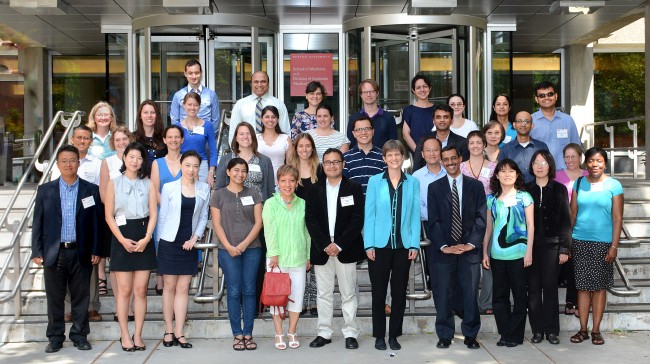Young Investigators Gather for Inaugural Genetic Epidemiology and Functional Genomics Workshop

Thirty-five young investigators gathered on the BU Medical Campus for the inaugural Genetic Epidemiology and Functional Genomics Workshop held in July. The meeting was hosted by the Framingham Heart Study (FHS), the Center for Translational Epidemiology and Comparative Effectiveness Research and Section of Preventive Medicine and Epidemiology at BU School of Medicine (BUSM).
Hailing from nine states and five countries, attendees heard from faculty and staff from the Framingham Heart Study (FHS), BUSM, Harvard Medical School, University of Massachusetts Medical School and others who presented on how they have utilized FHS data to answer career-building questions as well as specific instruction on how to analyze and access the FHS data. The group also attended a series of working lunches led by BUSM’s Emelia J. Benjamin, MD, ScM, on professional development topics.
Program Director Vasan S. Ramachandran, MD, DM, FACC, FAHA, Professor of Medicine and Epidemiology, Chief of the Section of Preventive Medicine & Epidemiology, and Principal Investigator of the FHS, developed the program because of the burgeoning availability of data from cohort studies, including genomic data, and the urgency of training the next generation of translational scientists with a focus on early stage investigators. “We are excited that we were able to highlight cutting-edge talks on genomic research, career development and grant writing tips, and training to access and analyze Framingham Heart Study data,’” said Ramachandran.
“The meeting was organized as part of a broader series of initiatives to equip faculty and fellows to interrogate large human cohort studies to better understand human disease,” added David L. Coleman, MD, Wade Professor and Chairman of the Department of Medicine. “In so doing, we hope to expand the capacity of our research community to use the power of extraordinary biomic information in well-phenotyped cohort studies to answer clinically important questions.”
For any inquires or questions about the program, please contact Dr. Ramachandran.